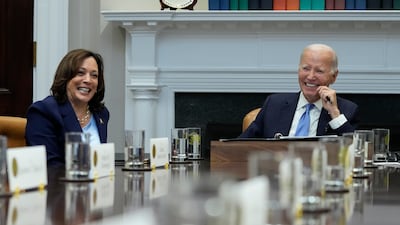Yet another federal government shutdown is looming in Washington, with the public and hundreds of thousands of civil servants bracing for the impact, including a complete suspension of nutrition, vaccination and other services for impoverished mothers and children.
Such government shutdowns are nothing new, having occurred more than 20 times since 1976. But the instances are becoming more frequent and disruptive over time, with the current impasse breaking new ground in two alarming ways.
First, the current dispute is not between Republicans and Democrats, or even the House of Representatives and the Senate. Instead, it has developed entirely within an increasingly dysfunctional Republican Party that is being held hostage by about 20 or so radical lawmakers in the House at odds with about 200 of their fellow Republicans.
So, it’s going to be almost impossible for Republicans, no matter how hard they try, to blame President Joe Biden or the Democrats for a dispute that is happening within their own ranks and the legislative body under their narrow control.
Ever since then House speaker Newt Gingrich pioneered the use of a deliberately engineered federal government shutdown as a political and policy weapon, following protracted battles over spending with president Bill Clinton, for a few weeks at the end of 1995 and the beginning of 1996, most shutdowns have been instigated by House Republicans. But they always left themselves some kind of plausible argument for why Democrats were truly responsible by forcing their hand in some manner.
That didn’t work for Mr Gingrich in the 90s, with Republicans taking most of the blame for his novel manoeuvre. As a result, it didn’t take long for him to lose his leadership role and political prominence, and the fiasco may have helped save Mr Clinton’s presidency.
Now, however, though House Republicans on both sides will strenuously try to point the finger at Mr Biden, the current dispute has nothing to do with partisan divisions.

The overwhelming bulk of Senate Republicans are also uninvolved and seem dismayed at the behaviour of the radical minority of their colleagues in the House who are forcing the crisis. While the House extremists claim to be on a principled crusade against what they see as irresponsible overspending by the Biden administration, in fact they are at odds with a 10-to-one majority of their own colleagues.
And this reveals the second key distinction between the current impending emergency and previous deliberately instigated government shutdowns over spending and other policy disputes: the current imbroglio isn’t in pursuit of any real policy goals.
At least Mr Gingrich and his successors who copied his tactic were able to broadly articulate what they wanted, or didn’t want. Not so with the current group of destructive reactionaries. Instead, they seem determined to simply say ”no”, not to congressional Democrats or the Biden administration, but to their own leader, House Speaker Kevin McCarthy, and the vast bulk of their colleagues.
There is a strong scent of anarchism about the so-called ”wrecking ball crew” that is forcing the government to its knees. This crew of radicals casts virtually all other Republicans as being in cahoots with the Democrats in a de facto single party representing wealthy donors and other ”elites” against the interests of ordinary Americans, and therefore appear almost as gleeful when going after Mr McCarthy as Mr Biden.
Moreover, they embody the anti-government sentiment that has long been a feature of the American far right taken to its logical conclusion.
These extremists no longer recognise any exception for the once sacrosanct military forces, which they denounce as "woke”, corrupted and weak, especially in comparison with the Russian military, which several of them inexplicably seem to revere. And they are even more hostile to what they cast as a “weaponised” federal law enforcement system, especially the FBI, which some have advocated decapitating, defunding and even disbanding altogether (particularly after the investigations and indictments of former president Donald Trump).
These lawmakers are so extreme that they forcefully dismiss the usefulness of almost everything the federal government, and even Congress itself, does as irrelevant, and even harmful, to the American people. Such rhetoric justifies rejecting virtually any proposed spending or other significant legislation and even rationalises disinterest about the potential impact on national security or law enforcement. It’s a nihilistic political perspective.
It’s hard to gauge how sincerely held these views might be, because these representatives all come from very right-wing and secure districts in which incumbency is a virtual guarantee of re-election, and because otherwise obscure Congresspersons can parlay this kind of populist anti-government demagoguery and pandering into valuable time on right-wing TV networks.
This is basically the same small group of marginal Republicans who tormented Mr McCarthy through an unprecedented 15 failed votes for the Speaker position and have been obviously chomping at the bit for another chance to take him on and, if he defies them, bring him down. He recently acceded to demands that he open a baseless – and likely to prove embarrassing for Republicans – impeachment inquiry into Mr Biden.
But the Speaker is aware that he, his party and institution will undoubtedly bear the blame for a shutdown. So, Mr McCarthy has been working on a last-ditch effort to pass a stopgap spending bill, although there is no indication it will succeed. More significantly, senators from both parties are working on a different stopgap spending measure that could keep the government afloat for four to six more weeks by gaining the support of all Democrats and enough Republicans in the House before the Saturday night deadline.
Reportedly, the main issue of contention in the Senate’s potential so-called “continuing resolution” is $25 million in new aid to Ukraine, which could meet with stiff resistance and disruptive outrage from pro-Russia Republican right-wingers in the House, including Mr McCarthy’s close ally, Marjorie Taylor Greene. Republican senators are divided between those determined to support Kyiv versus those who are even more determined not to create additional headaches for Mr McCarthy, who would probably face a protracted campaign by the radicals to oust him if aid to Ukraine is increased.
With Mr Trump urging a shutdown unless Republican extremists "get everything" they are demanding, with Mr McCarthy unable to control the House or even his own caucus, and with Republicans seemingly resolutely determined to prove incapable of the most basic functions of governance, Mr Biden is surely the most serene president ever to face a looming federal government shutdown.


